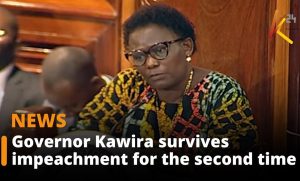Nairobi is winning accolades despite a lack of vision and development agenda by the county government led by DR EVANS KIDERO, explains ROBIN OBINO.
For a second year running, Nairobi has been named the most intelligent city in Africa based on internet usage and mobile penetration. The Kenyan capital failed though to make it to the world’s top seven finalists.
Cities that will battle it out for the 2015 Intelligent Community of the Year Award are Arlington County (U.S.), Columbus, (U.S.), Ipswich (Australia), Mitchell (U.S.), New Taipei City (Taiwan), Rio de Janeiro (Brazil) and Surrey (Canada).
According to the Intelligent Community Forum (ICF), “intelligent communities” are those that have taken ‘conscious steps’ to create an economy that can prosper in the broadband economy. The group has recently released its latest rankings, recognizing the achievements of communities that have built inclusive, prosperous economies on a basis of information and communication technologies.
If only the Nairobi county government led by Dr Evans Kidero could fix the myriad of problems besetting the city. ICF figures indicate that there were 17.3 internet users in Kenya in2013 and 2.7 billion globally. Mobile penetration was at 75.4 per cent in Kenya and 65 per cent in Africa in 2012. Nairobi, with a population of over 4 million, was the only African city that appeared on the shortlist of 21 hubs throughout the world for 2015.
The ambitious plan by the Kenyan government to enhance connectivity for the country is driven by Vision 2030, which places ICT as one of the important pillars to drive the economy of the country.
There are several aspects that shape the Kenyan document and pundits hope that if followed through, the the East African country could enjoy connectivity only experienced in developed nation.
John Kieti, the lead at communication hub, MLab, said in an exclusive interview with Diplomat East Africa, that it is good that ‘someone’ is planning ahead.
“That we are planning ahead ensures we are not caught off guard and hence global trends are more likely to play in our favour. Access to decent data connectivity at affordable rates will in the next few years be a key contributor to the national economy similar to road networks.
Already, broadband companies such as Jamii Telecom, with their product Faiba, promise its clients up to 100 megabytes per second (Mbps) by 2016. This is in line with the 2013 broadband strategy. Currently broadband connectivity delivers a minimum of 5 Mbps to homes and businesses for high speed access to voice, data, video and applications for development.
Meanwhile, for the urban areas, the optimum broadband speeds could be pegged at 40 Mbps. In the years following that, the broadband strategy envisions speeds of 300 Mbps for urban areas between 2018 and 2022; 1024 Mbps between 2023 and 2027 and ultimately broadband speeds of 2048 Mbps from 2018 to 2030.
With these speeds, the strategy also envisions that it could achieve 100 per cent penetration in key sectors such as schools and health facilities by 2030. Household penetration has been forecast to be 35 per cent in the same year.
Achieving this for Kenya, though, is not going be an easy ride for all the stakeholders. Internet prices in Kenya are high, despite the fact that demand is strong in urban areas.
“Access to broadband in Kenya for all citizens has the potential to generate enormous social economic benefits,” the strategy paper reads in part.
But the challenges are staring the government in the face. Nearly 90 per cent of Kenyans do not have access to broadband services, and few Kenyans have enough ICT skills.
According to the latest Communication Authority of Kenya (CA) report, over 16 million of Kenyans have access to the internet with over 9.5 million having online access via mobile connections. Meanwhile, broadband connections to the internet only account for just over 1,178,077 subscriptions.
But MLab’s Kieti also sees other challenges that could halt this plan. The issues of government procurement and open doors for corruption could hamper the implementation of this plan.
“The biggest challenge to actualising the nice and ambitious expectations of this strategy is not that of funding or technical capacity.It is probably corruption and selfishness among individuals or corporates entrusted as custodians of various aspects of execution.”
With many ICT incubation centres springing up in Nairobi, there is a need to ensure innovations to spur on economic growth.
“The promise of a knowledge based society facilitated by affordable and appropriate hardware, software and content infrastructure carries potential for Kenya to create a distinctive national competitive advantage. However the key is in having an efficient execution that surpasses the intended objectives by default since evolution of innovations and technology will not slow down to be in step with aspirations of static strategy documents,” Kieti says.





